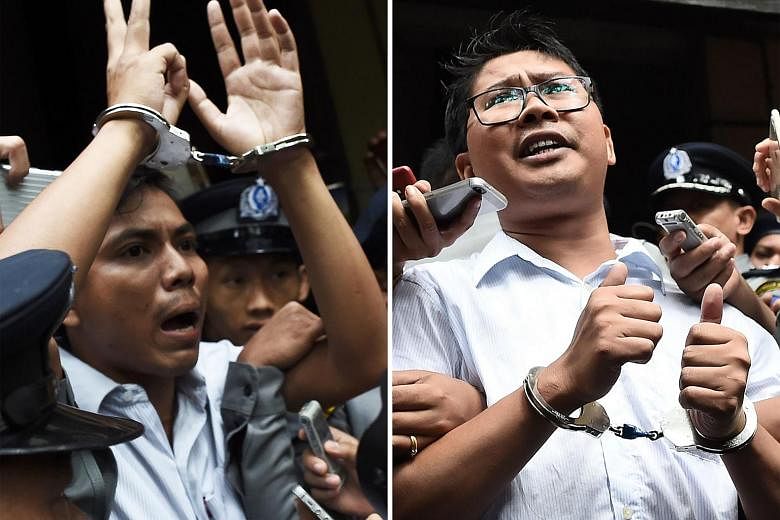YANGON (REUTERS, AFP) - A Myanmar court on Friday (Jan 11) rejected the appeal of two Reuters reporters sentenced to seven years in jail on charges of breaking the Official Secrets Act.
Wa Lone, 32, and Kyaw Soe Oo, 28, were convicted in September in a landmark case that has raised questions about Myanmar's progress towards democracy and sparked an outcry from diplomats and human rights advocates.
Prosecutors said they had classified information regarding security operations in Rakhine state, from where hundreds of thousands of Rohingya Muslims fled during an army-led crackdown the United Nations has dubbed "ethnic cleansing".
At the time of the arrest they were probing a massacre of 10 Rohingya.
The two men have insisted they were the victims of a police set-up, pointing to testimony from a serving officer who said a superior ordered others to entrap them.
The trial was widely regarded as a sham and seen as punishment for their probe, sparking outrage around the world including from US Vice President Mike Pence.
"It was a suitable punishment," said High Court Judge Aung Naing, referring to the seven-year prison term meted out by the lower court.
The defence has the option of making a further appeal to the country's supreme court, based in the capital Naypyitaw.
"Today's ruling is yet another injustice among many inflicted upon Wa Lone and Kyaw Soe Oo. They remain behind bars for one reason: those in power sought to silence the truth," said Reuters Editor-in-Chief Stephen J. Adler in a statement. "Reporting is not a crime, and until Myanmar rights this terrible wrong, the press in Myanmar is not free, and Myanmar's commitment to rule of law and democracy remains in doubt."
In their appeal arguments made last month, defence lawyers had cited evidence of a police set-up and lack of proof of a crime. They told the appeal court the lower court that tried the case had wrongly placed the burden of proof on the defendants.
The defence also said prosecutors had failed to prove the reporters gathered and collected secret information, sent information to an enemy of Myanmar or that they had an intention to harm national security.
Khine Khine Soe, a legal officer representing the government, told the appeal hearing last month that the evidence showed the reporters had collected and kept confidential documents. She said they intended to harm national security and the national interest.
The judge said on Friday "it was not acceptable" to say that the defendants had acted according to journalistic ethics. "It cannot be said that it was a set up," he said.
Standing outside the court building in Yangon where the judgment was pronounced, Kristian Schmidt, the EU ambassador to Myanmar, said the ruling was a "miscarriage of justice and it gives us great concern for the independence of the justice system of Myanmar".
Defence lawyer Than Zaw Aung, speaking after the ruling, said his team would discuss the option of a supreme court appeal with the two reporters. "We are very disappointed with the judgment," he said.
Outside the country, the two men have been hailed as heroes and jointly named Time Magazine's Person of the Year 2018, alongside other persecuted and slain journalists.
But they have gained little sympathy within Myanmar.
The violent military campaign in 2017 forced more than 720,000 Rohingya across the border to Bangladesh, with refugees bringing accounts of murder, rape and arson.
UN investigators have called for top generals to be investigated for genocide and singled out civilian leader Aung San Suu Kyi for criticism for failing to stop the crackdown.
The image of the formerly renowned champion of human rights has been further damaged by the Reuters trial, and she has yet to speak up in their defence.
Reporters Without Borders representative Daniel Bastard said it would be "utterly devastating" if the court upholds the verdict. "The message that Myanmar authorities would send is absolutely dreadful: seven years in prison, this is the price you'll have to pay if you dare investigate subjects we don't want you to."

